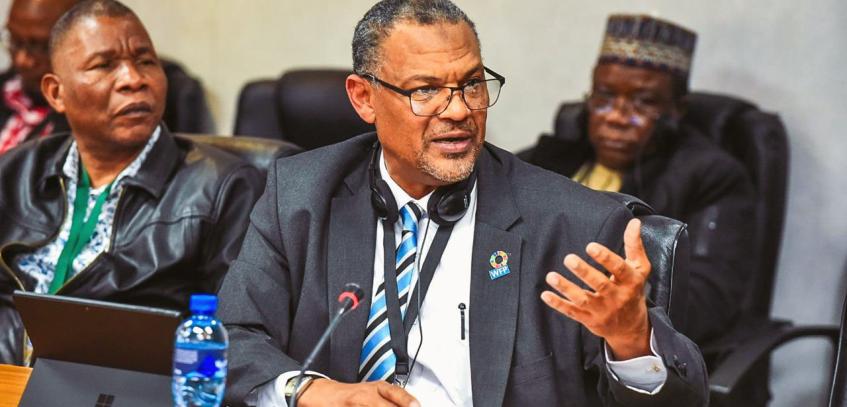The Pan-African Parliament’s Permanent Committee on Rural Economy, Agriculture, Environment, and Natural Resources held two sittings on Tuesday during the ongoing 3rd Session of the Sixth Parliament, which is under the African Union's Theme of the Year focused on Education. The committee's activities began with a joint session with the Committee on Justice and Human Rights to explore collaborative roles in monitoring the implementation of Agenda 2030 for the SDGs and the AU Agenda 2063. Following this, Parliamentarians engaged with the World Food Programme (WFP) to discuss critical issues related to agriculture, food security, and nutrition. Dr. Hameed Nuru, Director of the WFP African Union Global Office and Representative to the AU and EAC, delivered a compelling and informative presentation on WFP programs and the urgent issues facing the continent. He highlighted the WFP's crucial role in reducing hunger and malnutrition, improving educational outcomes, enhancing agricultural productivity, and strengthening community resilience through various initiatives.
The World Food Programme (WFP) is a major partner to the African Union in addressing food insecurity and malnutrition through emergency food assistance, nutrition support, feeding programs, and agricultural initiatives. By providing immediate aid to those affected by crises and supporting long-term development, the WFP has been instrumental in reducing hunger and acute malnutrition, as well as implementing initiatives that improve educational outcomes, enhance agricultural productivity, and strengthen community resilience. Additionally, the WFP collaborates with governments to develop effective food security policies and conducts data-driven research to inform interventions.The World Food Programme's impact is evident in improved livelihoods, increased school attendance, and better-prepared communities across the continent, making it an invaluable advisor to African Parliamentarians.
Dr. Nuru emphasized the stark reality that Africa cannot yet feed itself, affecting broader developmental goals such as education and health. Despite a budget reduction from USD 12 billion to 8.5 billion, the WFP continues to make significant progress, aided by contributions from the African private sector and the African Development Bank. Dr. Nuru called on African Parliamentarians to advocate for increased agricultural budget allocations in their national parliaments. He stressed the importance of prioritizing food security, noting that food insecurity is increasingly becoming a threat to national security. MPs acknowledged the need for clearer budget allocations for specific projects to ensure effective use of resources.
The session addressed the issue of food aid politicization, where aid distribution is often influenced by party, political, and ethnic lines, undermining efforts to combat hunger and malnutrition. The need for unbiased and equitable distribution of aid was highlighted as crucial for the success of programs like those of the WFP. Discussions also touched on the critical issue of water availability, with future conflicts predicted to center around water resources. Dr. Nuru urged parliamentarians to advocate for the redirection of resources from conflict to providing clean water and eradicating hunger.
The discussion noted the underrecognition of women’s contributions in agriculture and food security. Dr. Nuru recommended initiatives such as organizing women into cooperatives, enhancing their political representation, and promoting gender equity to address food security and nutrition challenges from the grassroots effectively. Concerns were raised about the health risks posed by imported food products, with Africans not knowing the contents or source of food which they’re consuming hence posing a major health and security risk. The low percentage (30%) of WFP-procured food aid sourced from African markets was also raised by PAP Parliamentarians. Dr. Nuru acknowledged this challenge and highlighted the potential of the African Continental Free Trade Area (AfCFTA) to enhance local procurement by improving logistics and reducing costs.
Parliamentarians discussed the need for an education system that encourages youth involvement in agriculture and innovation in food systems. Dr. Nuru recommended leveraging STEM education to engage youth in addressing food security challenges. He also challenged parliamentarians to adopt initiatives that do not necessarily require funding but can have a significant impact, such as corporate philanthropy, government food subsidies, and inclusive policies for women. He stressed the importance of pushing for holistic food systems and highlighted food security as a national security issue, urging MPs to prioritize it in their legislative agendas.
In his closing remarks, Dr. Nuru encouraged Parliamentarians to move beyond colonialism rhetoric and focus on actionable solutions within their spheres of influence to address conflict, hunger, and malnutrition. The WFP committed to continued collaboration with the committee, offering data and support to aid legislative efforts.
The Pan-African Parliament’s Permanent Committee on Rural Economy, Agriculture, Environment, and Natural Resources also considered minutes and matters arising from the its last sitting in 2023, and reviewed its draft Activity Report for March 2023- March 2024, which is to be presented to the plenary within the course of the session.








